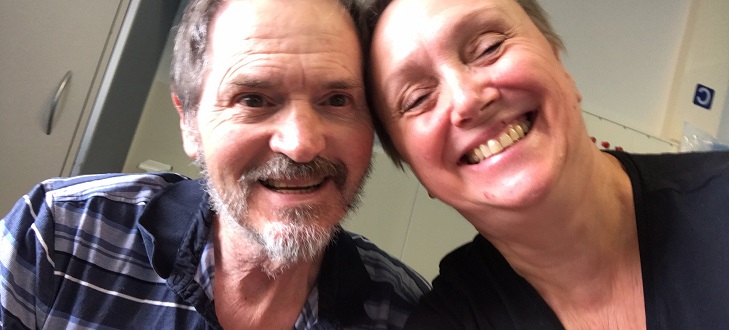Lorraine Anderson, 62, retired as a nurse and midwife to look after her husband, Steve, 69. He was a teacher and fitness coach until he developed dementia and Parkinson’s disease. In Dementia Awareness Month, Lorraine shares their story.
—
Steve and I have been together for 24 years. He was diagnosed with Parkinson’s disease in 2014, but, in hindsight, had symptoms for much longer. He was diagnosed with Parkinson’s dementia in 2019, but again, had shown signs before that.
It was devastating and scary to have one diagnosis after the other. Even though I was a qualified nurse and had looked after many people with Parkinson’s and dementia during my career, it’s very different when it happens in your family.
Here’s my story and the lessons I’ve learnt as a carer and wife.
Understanding the disease
There are 472,000 Australians living with dementia, and 250 people are diagnosed each day. Dementia is complex and poses different challenges for every individual and their families as it progresses. It presents differently for every person diagnosed and there are many types, but it causes a progressive decline in a person’s functioning. It affects their thinking, behaviour and ability to perform everyday tasks.
Read more: New films show the fear and loss that come with dementia
Even as a qualified nurse, my knowledge of dementia was incomplete, and I sought information from reputable sources and our doctor to help me understand what my husband was experiencing. There is so much more to dementia than what is seen on the surface, and having a comprehensive understanding of the disease is crucial to being able to support my husband, while also maintaining our relationship.
With all the information available on the internet it can feel overwhelming at times, which is why I use a free online tool called My Dementia Companion to find credible support information from professionals and practical tips from other carers. I have access to a one-stop shop of streamlined information to help me, other family members and our support workers streamline information. There is also a free online course called Understanding Dementia run by the University of Tasmania, which I very much enjoyed and which enriched my knowledge.
Changes in your relationship
People with dementia and those of us caring for them can feel both grief and loss for the person they were, our relationship and the history and future we share. However, it’s critical that we understand the nature of the disease and how it can affect our partner or loved one so that we may be better able to give them the support they need.
Read more: People with dementia need more support for decision-making
The dementia journey is different for everybody, but we have adapted the roles in our relationship as the dementia progresses and continue to love each other regardless. It is so important to get a good balance between being a carer and being a wife, so I make a point of taking Steve on a ‘date’, showing affection and consulting him in the decision-making of everyday life.
Knowing when you need help and taking care of yourself
There are 1.6 million Australians helping to care for someone living with dementia. Being a carer has many challenges. I have taken all responsibility for decision-making, which can be overwhelming at times. Steve and I try to make decisions about his care together, but everyday tasks such as making and taking him to appointments, going out for exercise and to buy groceries, as well as being responsible for running the household is exhausting.
Read more: Who’s looking out for the carers?
Engaging support workers is crucial to help manage the intensity of day-to-day tasks. I found our support workers from the two-sided online community, Mable.com.au. They help take Steve to various appointments and go out for exercise, which has always been important to him as a retired fitness coach. They also take him shopping and to his favourite club.
That extra support gives me some time to care for myself and recharge, so I can better support Steve. It also means I can do the shopping and get medications without either leaving him on his own (which is not an option), dragging him with me, or worrying about when I will find time to do these things.
September is Dementia Awareness Month, which is a crucial opportunity to raise awareness of the impact of dementia on the individual, as well as for the loved ones who care for them. Dementia affects almost 50 million people worldwide and every three seconds someone develops the disease. It’s important to shine a light on the support available to everyone affected by dementia so we can better care for our loved ones.
Have you had to become a carer for parents or your partner? What ‘survival’ techniques have you developed? Why not share your experience in the comments section below?
If you enjoy our content, don’t keep it to yourself. Share our free eNews with your friends and encourage them to sign up.

